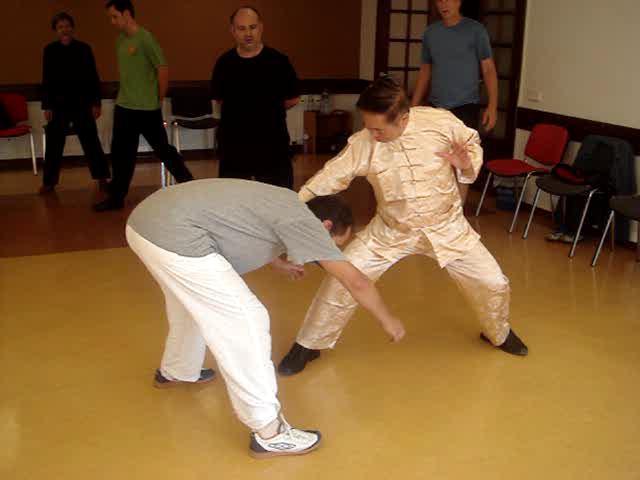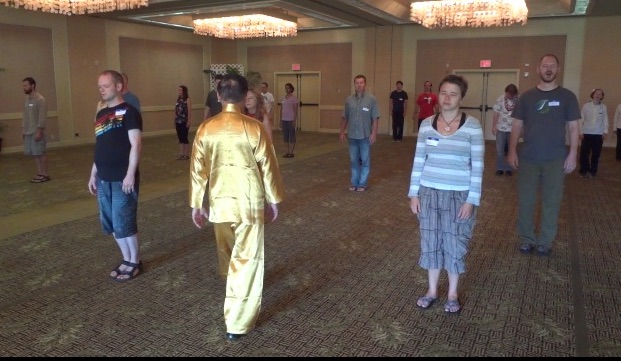DEALING WITH EMOTIONS IN COMBAT AND IN ZEN TRAINING

A shoot is a suicidal move in combat
Question 13
When we spar or fight how should we deal with emotions? In the Zen approach are emotions something to let go of? Are they a hindrance to being combat efficient? Or should we focus our emotions in a fight?
Sham
Answer
In a life-death fight, emotions should be left aside as they interfere with one’s combat efficiency. Irrespective of what types of emotions are involved, they affect the fighter’s performance, both mentally and physically. Working oneself into a frenzy, as a world known Taijiquan master once stated, is unwise. Indeed, in any style of kungfu, especially in Taijiquan, the more relaxed a fighter is the more efficient he will be, in fighting as well as in daily life.
Hence, as I have often advised, in a serious challenge match, even though it may not be as serious as a life-death combat but serious enough to get us involved in the fight which we would like to avoid if we can, our Shaolin Wahnam fighters representing our school must not be afraid or hesitant in hurting opponents crucially or even fatally.
If an opponent rushes in with a shoot, for example, our fighter must not be afraid or hesitant to strike the challenger’s head with his palm, which may maim or even kill the challenger.
With the value of compassion we teach in our school, it is likely that our Shaolin Wahnam fighter might not strike a challenger’s head when he has a chance to do so. This moment of hesitance, due to his compassionate emotion, would turn his victory to defeat. More seriously, this challenger, if he is irrational enough to challenge our school, would be irrational enough to cause serious hurt to our fighter. Therefore, I have to repeatedly warn our fighters to leave aside emotions, even noble ones, when engaged in a fight of this nature.
It is naïve if someone asks how we know we could cause serious injury to an opponent if we strike our palm on his head if we had not done so? It is like asking how we know we would cause serious injury to a person if we shoot a gun at him if we had not shot any living person. If we can break a brick so thoroughly that it burst into powder (please see some of our brick-breaking videos), we can also break a skull into pieces. Or if we have enough internal force to break the bottom of two bricks, we also have enough internal force to cause serious damage to the brain of a living person without cracking his skull.
Nevertheless, fights are not usually a matter of life-death combat, and emotions or considerations for others’ emotions do play an important part. If a drunken man attacks you in a pub, you don’t have to burst his skull into pieces, you merely push him aside or fell him onto the floor, but without the finishing strike.
In friendly sparring, including sparring with martial artists of other schools, we do not even hit our opponents. We stop an inch from target. It is better to win a friend than to win a match.
A good way to deal with emotions is to gently sink your chi to your dan tian. This was how past masters dealt with emotions in their fights, including life-death ones. Gently sinking your chi to your dan tian not only attains emotional balance, instead of letting emotions control you, you also have more force ready for use and better mental clarity for combat.
Emotional balance does not mean you have no more emotions. It means you can control your emotions so that they will not affect you in your combat or other activities. If you want to be compassionate or destructive, you can do so detachedly and efficiently.
Yes, in Zen cultivation one should let go of emotions, or have good emotional control. Letting go of emotions is more urgent in Zen Buddhist monks because to be detached is an important aspect of Buddhist training. The fact that they leave their family and society indicates their detachment.
Nevertheless, as tolerance and compassion are important teachings in Buddhism, Zen Buddhist monks are also tolerant and compassionate. This is not a contradiction, though it may appear to be. They are tolerant and compassionate in a detached manner, but not irrationally involved. For example, if a preacher advocating doctrines contradictory to Zen Buddhism was found wanting for food and shelter, Zen Buddhist monks would feed and house him in their temple, but they would not hug him and kiss him all over, nor will they deny him food and shelter due to his opposing teaching.
However, at the highest level when Zen Buddhist monks are ready to attain Enlightenment, they would be emotionless, for any emotions, even noble ones, would bide them to the phenomenal realm. It is because of their great compassion that Bodhisattvas postpone their Enlightenment, or return to the phenomenal realm from Enlightenment to help sentient beings.
When we spar or fight we should tame our emotions, just like we tame our mind. We should not focus on our emotions in a fight. Strong emotions, like wandering thoughts, distract us and are a hindrance to our combat efficiency.
This does not mean that we become emotionless. We control our emotions instead of letting our emotions control us. We are detached, and can be compassionate to let our opponents go if we want to, or to decisively strike down an opponent if it is necessary. Our efficiency and detachment derived from Zen training, i.e. training of mind, can be beneficially used in combat or in daily life.

One should let go of emotion in Zen training
The above is reproduced from the thread Zen Intensive in Hawaii Q&A in the Shaolin Wahnam Discussion Forum
LINKS
